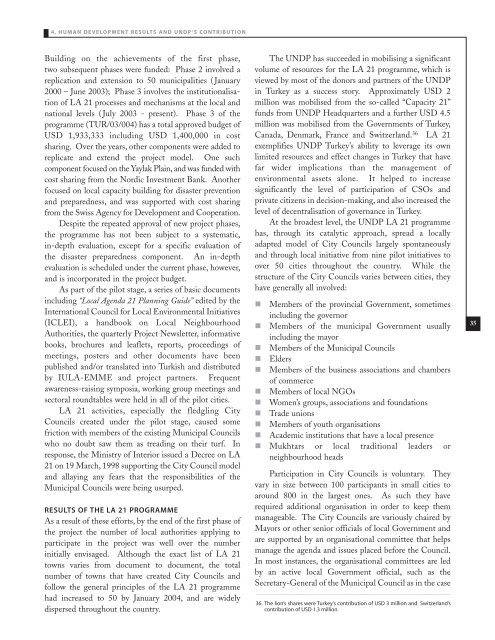Reports - United Nations Development Programme
Reports - United Nations Development Programme
Reports - United Nations Development Programme
Create successful ePaper yourself
Turn your PDF publications into a flip-book with our unique Google optimized e-Paper software.
4. HUMAN DEVELOPMENT RESULTS AND UNDP’S CONTRIBUTION<br />
Building on the achievements of the first phase,<br />
two subsequent phases were funded: Phase 2 involved a<br />
replication and extension to 50 municipalities ( January<br />
2000 – June 2003); Phase 3 involves the institutionalisation<br />
of LA 21 processes and mechanisms at the local and<br />
national levels ( July 2003 - present). Phase 3 of the<br />
programme (TUR/03/004) has a total approved budget of<br />
USD 1,933,333 including USD 1,400,000 in cost<br />
sharing. Over the years, other components were added to<br />
replicate and extend the project model. One such<br />
component focused on the Yaylak Plain, and was funded with<br />
cost sharing from the Nordic Investment Bank. Another<br />
focused on local capacity building for disaster prevention<br />
and preparedness, and was supported with cost sharing<br />
from the Swiss Agency for <strong>Development</strong> and Cooperation.<br />
Despite the repeated approval of new project phases,<br />
the programme has not been subject to a systematic,<br />
in-depth evaluation, except for a specific evaluation of<br />
the disaster preparedness component. An in-depth<br />
evaluation is scheduled under the current phase, however,<br />
and is incorporated in the project budget.<br />
As part of the pilot stage, a series of basic documents<br />
including “Local Agenda 21 Planning Guide” edited by the<br />
International Council for Local Environmental Initiatives<br />
(ICLEI), a handbook on Local Neighbourhood<br />
Authorities, the quarterly Project Newsletter, informative<br />
books, brochures and leaflets, reports, proceedings of<br />
meetings, posters and other documents have been<br />
published and/or translated into Turkish and distributed<br />
by IULA-EMME and project partners. Frequent<br />
awareness-raising symposia, working group meetings and<br />
sectoral roundtables were held in all of the pilot cities.<br />
LA 21 activities, especially the fledgling City<br />
Councils created under the pilot stage, caused some<br />
friction with members of the existing Municipal Councils<br />
who no doubt saw them as treading on their turf. In<br />
response, the Ministry of Interior issued a Decree on LA<br />
21 on 19 March, 1998 supporting the City Council model<br />
and allaying any fears that the responsibilities of the<br />
Municipal Councils were being usurped.<br />
RESULTS OF THE LA 21 PROGRAMME<br />
As a result of these efforts, by the end of the first phase of<br />
the project the number of local authorities applying to<br />
participate in the project was well over the number<br />
initially envisaged. Although the exact list of LA 21<br />
towns varies from document to document, the total<br />
number of towns that have created City Councils and<br />
follow the general principles of the LA 21 programme<br />
had increased to 50 by January 2004, and are widely<br />
dispersed throughout the country.<br />
The UNDP has succeeded in mobilising a significant<br />
volume of resources for the LA 21 programme, which is<br />
viewed by most of the donors and partners of the UNDP<br />
in Turkey as a success story. Approximately USD 2<br />
million was mobilised from the so-called “Capacity 21”<br />
funds from UNDP Headquarters and a further USD 4.5<br />
million was mobilised from the Governments of Turkey,<br />
Canada, Denmark, France and Switzerland. 36 LA 21<br />
exemplifies UNDP Turkey’s ability to leverage its own<br />
limited resources and effect changes in Turkey that have<br />
far wider implications than the management of<br />
environmental assets alone. It helped to increase<br />
significantly the level of participation of CSOs and<br />
private citizens in decision-making, and also increased the<br />
level of decentralisation of governance in Turkey.<br />
At the broadest level, the UNDP LA 21 programme<br />
has, through its catalytic approach, spread a locally<br />
adapted model of City Councils largely spontaneously<br />
and through local initiative from nine pilot initiatives to<br />
over 50 cities throughout the country. While the<br />
structure of the City Councils varies between cities, they<br />
have generally all involved:<br />
Members of the provincial Government, sometimes<br />
including the governor<br />
Members of the municipal Government usually<br />
including the mayor<br />
Members of the Municipal Councils<br />
Elders<br />
Members of the business associations and chambers<br />
of commerce<br />
Members of local NGOs<br />
Women’s groups, associations and foundations<br />
Trade unions<br />
Members of youth organisations<br />
Academic institutions that have a local presence<br />
Mukhtars or local traditional leaders or<br />
neighbourhood heads<br />
Participation in City Councils is voluntary. They<br />
vary in size between 100 participants in small cities to<br />
around 800 in the largest ones. As such they have<br />
required additional organisation in order to keep them<br />
manageable. The City Councils are variously chaired by<br />
Mayors or other senior officials of local Government and<br />
are supported by an organisational committee that helps<br />
manage the agenda and issues placed before the Council.<br />
In most instances, the organisational committees are led<br />
by an active local Government official, such as the<br />
Secretary-General of the Municipal Council as in the case<br />
————————————————————————————————————<br />
36. The lion’s shares were Turkey’s contribution of USD 3 million and Switzerland’s<br />
contribution of USD 1.3 million.<br />
35

















